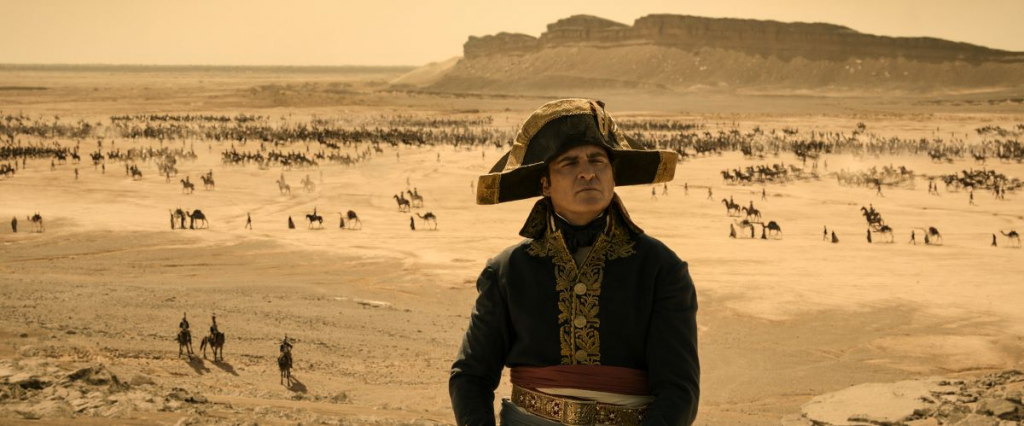Lincoln. Chaney. Oppenheimer. Churchill. Bonaparte. What do all of these men have in common?
If the last decade of entertainment has proven one thing, it’s that American audiences are loving their historical dramas. Blockbusters like “Lincoln,” “Vice,” “Oppenheimer” and “The Darkest Hour” have brought in millions of dollars in revenue with their majestic portrayal of some of the Western world’s pillars of history. The latest film in the trend? Ridley Scott’s “Napoleon,” which was released this past Wednesday in theaters everywhere.
With a two hour 38 minute runtime, “Napoleon” invites its audience to witness the complete rise and fall of the infamous French warlord sprawling over the 15 years of his reign. The story starts in 1799 at the tail end of the French Revolution, and concludes at the Battle of Waterloo in 1815. Much of the focus of the film is placed on the troubled relationship between Napoleon (Joaquin Phoenix) and his lover Josephine (Vanessa Kirby), exploring Napoleon’s desperate longing to leave a legacy — and an heir — in his wake.
Alongside this plotline is the overarching story of Napoleon’s encroachment into Russia, highlighting his greatest strategic feats against Austrian and Prussian forces while illuminating his brutal and unfeeling tact. As the subject matter suggests, this is a film of epic proportion. To its credit, it never once feels overwhelming or hard to follow. Great visual storytelling allow the complexities of Napoleon’s story to melt into the background.
Unfortunately, not everything is great about this movie. While the film is a technical masterpiece, some of the artistic elements of the picture miss the mark by a wide margin.
The most glaring of these errors emerge from the component of the movie that bore the heaviest emotional weight — the relationship between Napoleon and Josephine. To put it briefly, almost every scene that features the Emperor and his Empress is confusing and unnecessarily ambiguous. The entire plotline feels incredibly half-hearted, as if Scott and his writers had something really interesting to say about the two but just decided to never say it. It’s “show-don’t-tell” taken to an extreme, which it should have never been taken to. By the end of the film, it is borderline impossible to tell how Josephine feels toward her estranged husband, and not in a good “leave it up to the viewer” way, but in a bad “I have no clue what this is supposed to mean” type of way.
This disaster could have been mitigated through the powerhouse cast that much of the onus of the script is rested on, but alas, that is not what happened. In fact, the most disappointing part of the entire display may actually be the leading man. While Kirby stands out in her part as Josephine, the same can not be said for Phoenix in his role as Napoleon Bonaparte.
Is it too much to ask for France’s greatest conqueror to, who knows, maybe have a French accent? Phoenix handles the psychological intricacies of the character with ease, but it feels lazy at times. It didn’t feel as if Phoenix was ever as emotionally connected with this script as he had been with others in the past, and it was reflected in drab dialogue and emotionless violence. With this kind of name headlining, it’s hard to think about anything but what could have been.
It isn’t all bad, though. As stated earlier, this movie is a technical marvel. There are some truly exhilarating battle scenes, reaching nearly a “Game of Thrones” scale. It can be extremely difficult to adhere any emotional value to massive clashes, especially in the briefer, motion picture format. In Scott fashion, the battles are epic and most certainly the most entertaining moments of the entire film. The action cinematography and color correction fits the period well, and the sound design left nothing to be desired. At the very least, the shallow content has a glitzy sheen to it.
But for the most part, that is all “Napoleon” has to offer. While not quite boring, there is nothing truly phenomenal about the film. The pacing is fine, the story is fine, the writing is mediocre and it looks pretty — so, it is exactly like most blockbusters from the past decade. Need a French fix? Just watch “Les Miserables” or something instead.
Overall: 2.5/5



